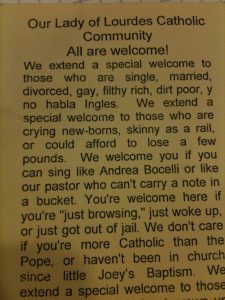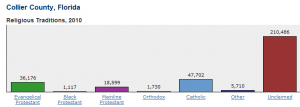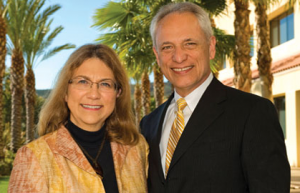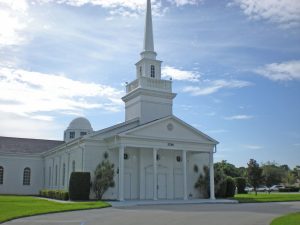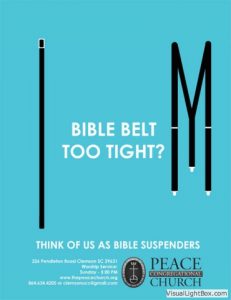Before the economic downturn job perks at top companies were significant and, in many cases, expanding. During the most recent lean years many companies have scaled back in all areas, including perks. Google is well known for its creative work spaces and generous perks. Earlier this year they added a new death benefit payable to the surviving partner or spouse of any employee who dies. More specifically, Google will "pay the spouse or partner of a deceased staffer Read More …
An Extravagant Welcome (#0816)
John Acuff recently shared the extravagant (and lengthy!) welcome found in the bulletin at Our Lady of Lourdes Catholic Community in Daytona Beach, FL: We extend a special welcome to those who are single, married, divorced, gay, filthy rich, dirt poor, yo no habla Ingles. We extend a special welcome to those who are crying new-borns, skinny as a rail or could afford to lose a few pounds. We welcome you if you can sing like Andrea Bocelli or like our pastor who can’t carry a note in a Read More …
Religion in Your County (#0815)
I was pleasantly surprised to learn the Association of Religion Data Archives offers free and easily searchable county-level information on religion (a big thanks to Jerry Park for mentioning it a few days ago). A few seconds after clicking through to the site I was viewing data on my current county of residence. The bar graph appears below, but the actual data produced by the county search includes the 2010 report broken down by religious bodies and the ability to see Read More …
12 Marks of Convergence Christianity (#0814)
Eric Elnes, Senior Minister of Countryside Community Church (UCC) and host of Darkwood Brew, has recently written several blog posts on Convergence Christianity. His latest post features twelve defining characteristics, which are evenly divided into three categories: Love of God, Love of Neighbor, and Love of Self. Elnes attributes resonate with others, including Brian McLaren, Phyllis Tickle, Frank Schaeffer, and Diana Butler Bass. Love of God They are letting go Read More …
Review of No Longer Invisible (#0813)
Meet the Authors Douglas Jacobsen and Rhonda Hustedt Jacobsen have been married for more than three decades, and both serve as professors at Messiah College. Douglas is distinguished professor of church history and theology (I have reviewed his most recent work: The World's Christians). Rhonda is professor of psychology and director of faculty development. Together they have co-authored three books: Scholarship and Christian Faith: Enlarging the Read More …
Prayer of Consecration/Blessing for Sunday, August 5 (#0812)
God of new beginnings, we approach your table desiring an enduring connection with you. In the blessing of this bread and this cup, bring the way of Jesus into focus. Enlarge our view of the abundant life. Remind us of the call to follow, and strengthen us to travel that path. May our hunger be fully satisfied with the extravagant provision of the Bread of Life in whose name we pray. Amen. Read More …
Call to Worship for Sunday, August 5 (#0811)
Our journey into this moment is intentional; we find ourselves fully here as we set aside activity for stillness certitude for curiosity self-interest for communal possibility We open ourselves to the Divine, seeking nurture and nourishment connection and communion healing and wholeness We welcome the possibility of transformation as together we worship the God of Many Names Read More …
Bible Belt Too Tight? (#0810)
Peace Congregational Church (United Church of Christ) in Clemson, SC is a new church with a creative marketing campaign designed to share the congregation's progressive form of Christianity, including their extravagant and inclusive welcoming mentality, with their community. The effort includes "a series of 10 catchy, thought-provoking posters lifting up the church’s commitment to re-imagine faith, justice and mission." So What? The United Church of Christ's decade old Read More …
Episcopalian Praise for the UCC (#0809)
John Shelby Spong served as bishop of the Episcopal Diocese of Newark for 24 years before his retirement in 2001. In retirement, he has been a prolific writer and speaker. His latest essay, "A Salute to the United Church of Christ," portrays the United Church of Christ (UCC) as a denomination with the potential to "inspire, bring about and participate in the necessary reformation required to break the Christian faith out of its dying patterns." While Spong has had Read More …
A New Chick-Fil-A Conversation (#0808)
Monday, July 16 will be remembered as an important day in the life of the business known for its chicken sandwiches and creative marketing. That was the day when Dan Cathy, President of Chick-Fil-A, was quoted in a Baptist Press article about several topics, including his understanding of the company's "Christian" view of marriage and family: We are very much supportive of the family -- the biblical definition of the family unit. We are a family-owned business, a family-led Read More …

